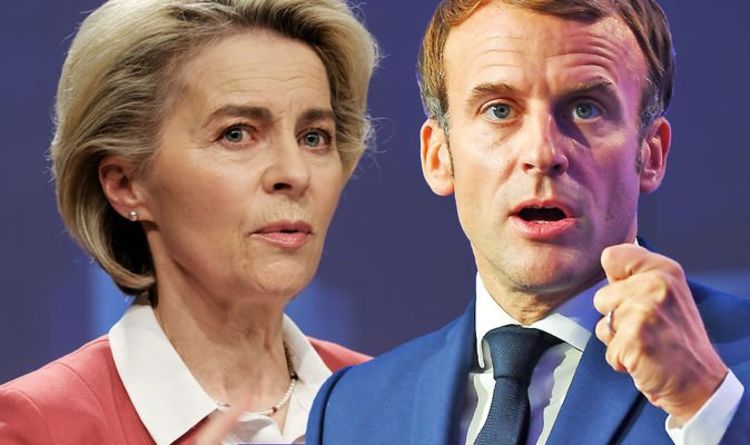Angela Merkel avoids handshake with Ursula von der Leyen
We use your sign-up to provide content in ways you’ve consented to and to improve our understanding of you. This may include adverts from us and 3rd parties based on our understanding. You can unsubscribe at any time. More info
The people of France believe the EU is more fragile and less resilient to crises than it used to be, a new survey has revealed.
While those polled are sceptical of the bloc’s strength, they seem to trust in their leader, President Emmanuel Macron, whom they have dubbed the embodiment of the Union.
The presidency of the European Council, which rotates among the 27 EU member states every six months, will be in the hands of France from January 1.
But the results of a poll conducted from November 10 to 17 suggest Mr Macron’s people may not be overly enthusiastic about the start of their turn.
A key area where voters showed disapproval of was the EU’s current level of solidarity.

49 percent of respondents said they think members’ ability to show support for other nations will further deteriorate in the coming months, while 24 percent anticipate the opposite and 19 percent expect it to remain the same.
61 percent of those surveyed think EU countries should have solidary.
Two years after the start of the COVID-19 pandemic, 51 percent of respondents think Europe has not been up to the task, 34 percent confess they don’t really know how the EU has responded to Covid, and 44 percent praise the bloc’s actions.
The poll asked 2,000 adults what the EU should be above all.

24 percent replied “an economic project to carry weight on the international scene” and 21 perecent said “a project geared towards the citizens of all member countries”.
Respondents expressed concerns over where the EU is heading, with only seven percent saying they were “very confident” of its future and a staggering 28 percent claiming they would be eager to see France leaving the bloc.
Of those who would potentially say yes to “Frexit”, 36 percent are aged 35 to 49.
Still, 58 percent view the political organisation as essential in keeping peace in Europe and beyond; 49 percent see it as an important promoter of culture, and 49 percent believe it stands up to defend society’s fundamental rights.
DON’T MISS
Senior EU officials ‘see opening’ after Omicron for centralising revenue streams [INSIGHT]
Covid LIVE: Germany panic as intensive care patient numbers over Christmas to hit new peak [ANALYSIS]
Covid robocops could be introduced to ‘detect and discourage lapses in social distancing’ [REPORT]

The Viavoice survey, commissioned by France Télévisions, Radio France and France Médias Monde, found that awareness of the Union’s leaders is rather low as only 45 percent knew about the position of Ursula von der Leyen, President of the European Commission.
President Macron and outgoing German Chancellor Angela Merkel are in respondents’ eyes the two European figures who most embody the EU.
The results of the poll come at a delicate time for the bloc, with heightened tensions over the rule of law with Poland and Hungary; a huge influx of asylum seekers crossing the borders of Poland, Lithuania and Latvia from Belarus, and a renewed wave of coronavirus restrictions necessary, in part, due to low vaccination rates across some member states.
Ms Von der Leyen said in Brussels on Wednesday: “We have the vaccines, the life-saving vaccines, but they are not being used adequately everywhere. And this costs… this is an enormous health cost coming along.
“One-third of the European population is not vaccinated… not each and every one can be vaccinated — children, for example, or people with special medical conditions — but the vast majority could.
“How we can encourage and potentially think about mandatory vaccination within the European Union, this needs discussion.
“This needs a common approach, but it is a discussion that I think has to be met.”
The EU head has urged leaders to deploy booster jabs and encouraged them to implement tighter rules to prevent the spread of the new Omicron variant.
Source: Read Full Article





